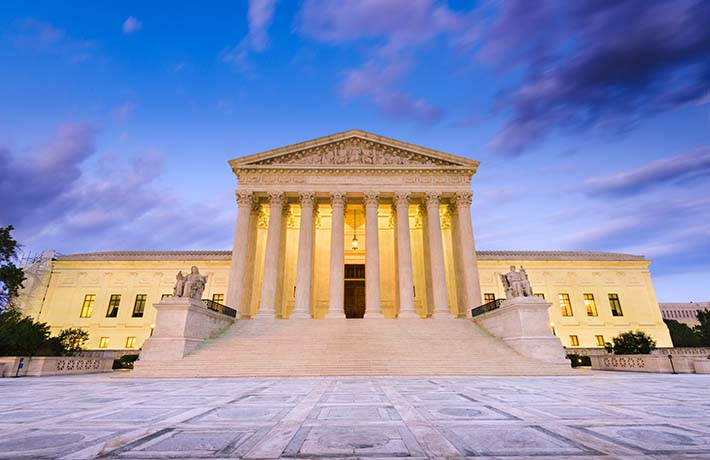01-14-2022 |
The Supreme Court Has Ruled on the OSHA and CMS Vaccine Mandates, and the Result is...Mixed.
By: Danielle Smid

On Thursday, January 13, 2022, the Supreme Court of the United States finally answered the question of whether the Biden administration’s vaccine mandates for certain employers will be enacted or not. The answer is mixed but clear: the Occupational Safety and Health Administration’s (“OSHA”) Emergency Temporary Standard (“ETS”) vaccine mandate applying to large employers is invalid, but the Centers for Medicare & Medicaid Service’s (“CMS”) vaccine mandate is permissible.
We parsed the details of these two vaccination requirements in a prior blog entry, but here is a quick refresher. OSHA (a division of the Department of Labor) released the ETS in fall 2021. The ETS sought to require employers with 100 or more employees to get all of their employees vaccinated against COVID-19. Unvaccinated employees would have been required to submit a negative test for COVID-19 on a weekly basis and wear a face mask in the workplace. The ETS also included several administrative and preventative tasks for employers to perform. Similarly, CMS announced a vaccine mandate for healthcare workers at facilities participating in Medicare and Medicaid.
Now, OSHA’s mandate is out, but CMS’s mandate is still a go. Why the mixed result? Simply put, it has to do with the respective powers granted to OSHA and CMS by Congress and how narrowly the mandates are targeted.
As for OSHA’s ETS, the majority of the Justices of the Supreme Court (six of the nine) found that OSHA did not have the authority to broadly mandate vaccinations in the workplace. As Justice Neil Gorsuch put it, the question “is not how to respond to the pandemic, but who holds the power to do so. The answer is clear: Under the law as it stands today, that power rests with the States and Congress, not OSHA.” In short, Congress authorized OSHA to oversee workplace safety, but it did not clearly give OSHA the authority to adopt public health regulations. In fact, this type of health-related mandate by OSHA is largely unprecedented. Thus, the majority of Justices concluded that OSHA overstepped in issuing the ETS, which would have “encroached into the lives—and the health—of a vast number of employees.” It is notable that the Supreme Court acknowledged that OSHA may have the power to issue more targeted vaccination or masking mandates in “crowded or cramped” workplaces where COVID-19 “poses a special danger.” However, OSHA could not broadly regulate “the everyday risk of contracting COVID-19 that all face” while at work.
As for CMS’s vaccine mandate, the Supreme Court went the other way with five of the nine Justices voting in its favor. The Court noted that CMS has broad powers to set requirements it “finds necessary in the interest of the health and safety of individuals who are furnished services” at healthcare institutions participating in Medicare and Medicaid. Further, it was reasonable for CMS to conclude that a vaccination mandate was necessary because “COVID-19 is a highly contagious, dangerous—and especially for Medicare and Medicaid patients—deadly disease.” Although the Court acknowledged that this mandate is a step beyond what CMS has regulated in the past, it found that COVID-19 was similarly unprecedented. Thus, this mandate is appropriate because it is within the scope of authority granted to CMS by Congress, and it targets more specifically persons and places where the spread of COVID-19 is of heightened concern.
Let us not forget about the separate vaccination mandate for federal contractors. The Supreme Court did not rule on that mandate. However, the lower courts have, and a federal court in Georgia has already issued an order temporarily barring enforcement of the mandate nationwide. Thus, the federal government has pressed pause on that mandate until further notice.
So, what does this all mean?
Technically, these mandates will now return to the lower courts for further proceedings consistent with the Supreme Court’s rulings. That means that OSHA’s ETS is all but completely dead in the water and CMS’s mandate will soon be finalized. The White House acknowledged this result, stating that “it is now up to States and individual employers to determine whether to make their workplaces as safe as possible for employees” outside of the healthcare context. So, the large employer mandate related to having 100 or more employees is a thing of the past, but healthcare facilities will still need to comply with the CMS mandate. Currently, the CMS mandate has a January 27, 2022, deadline for employees to receive the first dose of a COVID-19 vaccine and a February 28, 2022, deadline for full vaccination, but those deadlines might change depending on how remaining court proceedings play out. Either way, employers subject to the CMS mandate should prepare for enforcement in the near future.
Although the Supreme Court’s rulings provide some much-needed clarity for businesses moving forward, it is undoubtedly true that questions, challenges, and disputes will persist as the country continues to grapple with the COVID-19 pandemic. The team at BrownWinick is ready, willing, and able to help you and your business face those problems with confidence. If you have questions related to this blog entry, prior entities, or what might lie ahead, please feel free to reach out to our firm. We are always happy to guide you through these complicated issues.
If you have questions, please contact your BrownWinick Employment law attorney.

